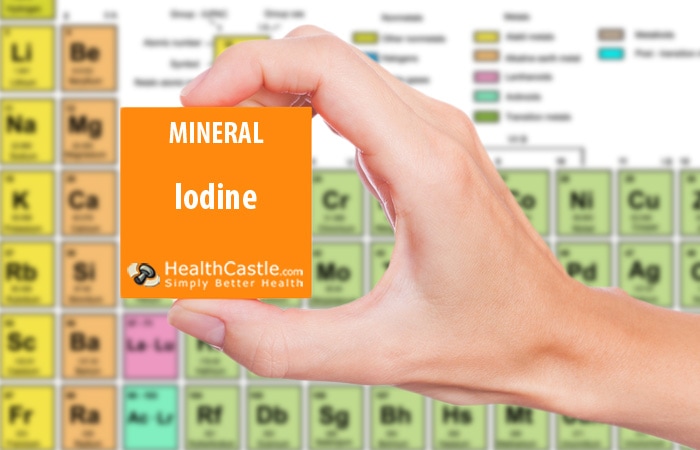
Written By: Carolyn Berry, RD
Title: Registered Dietitian
Alumni: University of British Columbia
Last Updated on:


Iodine is a trace mineral that the body needs to make thyroid hormones, which are essential for normal growth and development. Most of the world’s iodine is found in the ocean, where it is concentrated by sea life, especially seaweed.
Table of Contents
The Dietary Reference Intakes (DRI) for iodine are shown below:
| Age Group | Recommended Dietary Allowance (RDA) per Day | Tolerable Upper Intake Level (UL) per Day |
| Adults | ||
| 19 years and up | 150 mcg | 1,100 mcg |
| Kids and Youth | ||
| 1 to 3 years | 90 mcg | 200 mcg |
| 4 to 8 years | 90 mcg | 300 mcg |
| 9 to 13 years | 120 mcg | 600 mcg |
| 14 to 18 years | 150 mcg | 900 mcg |
| Special Considerations | ||
| Pregnant women 14 to 18 years | 220 mcg | 900 mcg |
| Pregnant women 19 years and up | 220 mcg | 1,100 mcg |
| Lactating women 14 to 18 years | 290 mcg | 900 mcg |
| Lactating women 19 years and up | 290 mcg | 1,100 mcg |
Iodine is essential for the production of thyroid hormones. Thyroid hormones regulate many important biochemical reactions in the body, including protein synthesis and enzymatic activity, and are critical for metabolic activity. They are also required for proper skeletal and central nervous system development in fetuses and infants.
An iodine deficiency will cause the thyroid gland to become enlarged (called goiter), reflecting the body’s attempt to trap more iodine from the circulation and produce thyroid hormones. Goiter is more common in certain areas of the world where foods with iodine are lacking in the diet and where there are low levels of selenium in the soil (selenium is directly involved with certain functions of the thyroid gland).
Iodine deficiency may eventually lead to hypothyroidism, which can cause fatigue, weight gain, weakness, and/or depression. Interestingly, iodine deficiency can also cause hyperthyroidism, a condition characterized by weight loss, rapid heart beat, and fluctuations in appetite.
Severe iodine deficiency during pregnancy or infancy causes a condition called cretinism. This condition is characterized by hypothyroidism and will lead to malfunctioning of the thyroid gland and/or severe intellectual disability, deafness, stunted physical growth, and spasticity of muscles. If discovered in its initial stages, cretinism can be corrected with iodine supplementation.
Iodized salt, seafood, iodine-fortified bread and dairy products are all good sources of iodine. Iodine is also present in human breast milk and infant formulas. Fruits and vegetables contain iodine, but the amount varies depending on the iodine content of the soil.
| Food | Iodine per serving |
| Cod, baked, 3 oz | 99 mcg |
| Yogurt, plain, 1 cup | 75 mcg |
| Iodized salt, 1/4 tsp | 71 mcg |
| Cottage cheese, 1 cup | 56 mcg |
| Milk, 2%, 1 cup | 56 mcg |
| Shrimp, 3 oz | 35 mcg |
| Tuna, canned, 3 oz | 35 mcg |
| Egg, 1 large | 24 mcg |
| Bread, white, enriched, 1 slice | 23 mcg |
| Cheese, cheddar, 1-1/2 oz | 22 mcg |
| Cereal, Raisin Bran, 1 cup | 11 mcg |
| Lima beans, cooked, 1/2 cup | 8 mcg |
In the United States: The % daily value gives you an idea of how much iodine is in the food you eat. The daily value for iodine is 150 mcg, which is the same as the DRI for adults. The number you see on the Nutrition Facts label is a percentage calculated by dividing the amount of iodine in one serving of the food by the DV. Using an example from the above table, 3 oz of shrimp containing 35 mcg of iodine would have 23% of the DV for iodine. the FDA does not require food labels to list iodine content unless a food has been fortified with this nutrient.
In Canada: The daily value for iodine in Canada is 150 mcg. Listing the daily value for iodine on the Nutrition Facts label is optional.
Selenium: A deficiency in selenium can result in less iodine being available for the thyroid to use in making new hormones.
Alumni: University of British Columbia – Carolyn Berry is a Vancouver-based Registered Dietitian, self-proclaimed foodie, marathon runner, and owner of Berry Nourished. Carolyn works in a variety of areas including clinical nutrition, outpatient counselling at Medisys Preventive Health Clinic, as a nutrition tour leader with Save-On-Foods, and in the media, including segments on CBC Television, CKNW and Spice Radio. Through informative and practical nutrition advice and her food-first approach to health, Carolyn fulfills her passion to empower others with knowledge about nutrition so that they can make the best decisions to improve their health. She strongly believes that food should be both healthful and delicious.
How to Choose the Right Potato For Your Dish
Pack Your Own Security-Approved Vegetarian Food for Air Travel
Hi Carolyn, Amazing article. Should the salt item carry both iodine and sodium content in the package label.